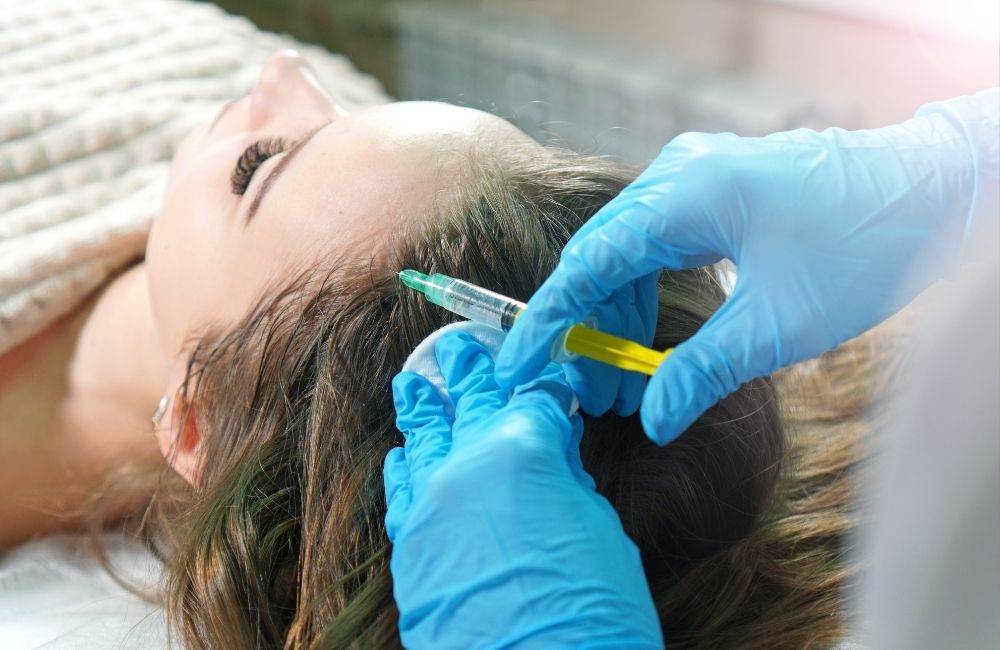Hair loss is something we all struggle with, but it is not our favorite. Especially when you wake up to find hair all over your pillow cover, followed by more when you comb your hair, this can be one of the worst ways to begin a day.
Hair issues such as hair loss can always be traced back to different causes, but most of the time it is due to excessive hairstyling or stress. The other possible causes are infections, autoimmune diseases, medications, radiations, etc.
Yet, there are causes such as androgenic alopecia that suggest hormones are important for hair growth. We will take a look at some of the most common doubts regarding Human Growth Hormone (HGH) effects on hair and some benefits of HGH for hair growth.

Contents
#1 Does HGH thicken hair?
HGH is a hormone associated with aging, and in addition to its contribution to skin development, it is also closely linked to hair growth. As a person ages, his body starts producing less and less HGH naturally. Having low levels of growth hormone can cause hair to become gray or thinner.
Using synthetic HGH can affect hair growth by improving thickening and regrowth. The effect of growth hormone is also said to be felt by those with gray hair attempting to grow new hair. Using synthetic HGH can affect hair growth by improving thickening and regrowth.
#2 Does HGH stimulate hair growth?
A lesser amount of HGH will affect hair growth in the entire body and not just on the head. Some people who are insensitive to HGH experience hair loss on their scalp along with other symptoms known as Laron syndrome. As a result of this syndrome, patients often develop alopecia and have thin and receding hair.
A lack of growth hormone affects body hair, as well. Research shows that replacement therapy with HGH can help in hair growth both on the body and on the head.
#3 Does HGH help in treating hair loss?
When it comes to treating the cause of androgenetic alopecia, the usual treatment includes common pharmaceutical products like vasodilator Minoxidil and 5-α reductase blocker Finasteride. The same kind of treatment shows negative results for a person who loses hair due to a hormone deficiency, which is why HGH therapy is recommendable.
HGH therapy holds new promise when it comes to treating alopecia and hormone-related hair loss.
#4 Does HGH prevent hair loss?
While both men and women experience hair loss, going bald is exclusive to men. There are not many effective treatments for receding hairlines. Among the common causes of baldness are genetics, but other factors, such as stress, nutrition, and environment, also play a role.
The use of HGH therapy has proven to be an effective way to restore lost hair and prevent excessive hair loss. As well as preventing hair loss, GH also appears to restore hair color.
#5 Does HGH increase hair growth?
We have a wide variety of remedies available in the form of serums, oils, colors, and other methods today to help us have thick, luscious, and healthy hair.
Nevertheless, these solutions aren’t always permanent, requiring you to continue buying products and pampering your hair.
With HGH, however, your hair grows quickly and improves since your body doesn’t have any issues with hair and produces it naturally.
Using synthetic growth hormone stimulates and enhances the process of hair growth while preventing hair loss especially among those with aging hair.
Does HGH Cause Hair Loss?
Hair growth and HGH both have some common misconceptions in common. A lot of people believe that HGH can cause hair loss.
Even though growth hormone impacts hair growth in a natural way, it will not cause hair loss, contrary to popular belief.
HGH, in fact, promotes hair growth and prevents hair loss, while the loss of hair is because of deprivation of growth hormones.
HGH stimulates the liver to produce IGF-1, which stimulates hair growth on your scalp, body, as well as facial hair in men.
Growth hormone is not harmful to your hair, but there is abundant evidence that low levels of HGH negatively affect your hair.
HGH Dosage For Hair Growth
When one chooses to undergo GH replacement therapy, one must understand that maintaining proper dosage is an essential part of compliance.
Human growth hormone injections differ from testosterone injections. You should take them regularly, i.e., every day. Keep in mind, however, that your doctor might prescribe you a customized dosage based on your medical profile, so you need to follow them.
If you plan to take any injection, despite how the label instructs, it is wise to consult your doctor.
HGH Uses for other human development
Growth hormone has been used by both children and adults since 1985.
Children with short stature or poor growth can benefit from it. As an adult, HGH can be used in the treatment of short bowel syndrome, growth hormone deficiency, and muscle wasting disease.
Misuse Of HGH
Since HGH can increase performance, many have been misusing it for years.
People use HGH to gain muscle mass or enhance athletic ability, which FDA does not approve.
Many use different HGH products to reverse ag and body issues without proper research. Again, FDA does not approve of it nor does it have any anti-aging benefits.
The takeaway
Your hair can be one of your most beloved parts, and some even attribute their self-confidence to it. Most hair loss treatments have side effects and aren’t very effective against hair loss. The HGH for hair growth is FDA approved, and if your doctor directs the dosage, chances are you’ll see results.
When doing HGH for hair loss, where is The HGH injected? Is it in the scalp at the hair? Or subcutaneous anywhere in the body?